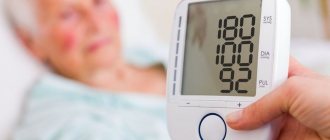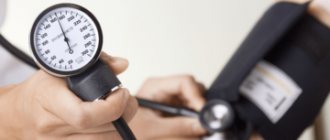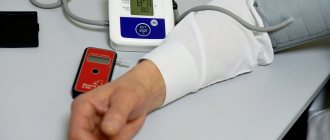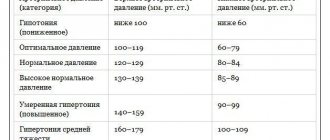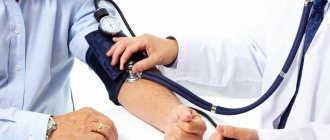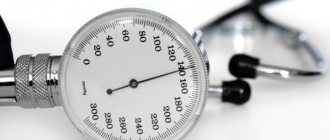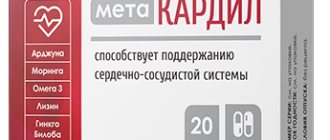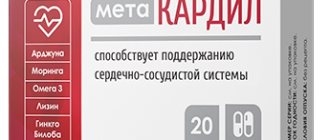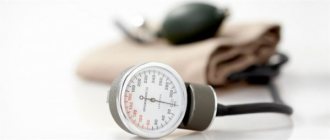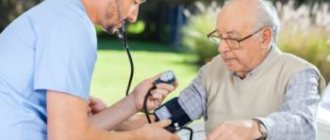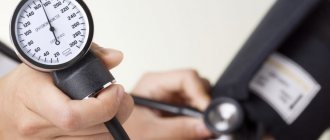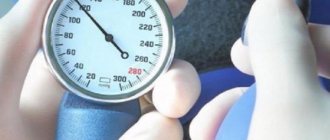Blood pressure readings can indicate disturbances in the functioning of internal organs and vital systems. For doctors, pressure indicators are markers that allow them to determine the type and form of pathology. A pressure of 170 over 100 signals not only hypertension, but also problems with the heart. With such high blood levels, mandatory medical attention is required. First you need to lower your blood pressure, exclude its further increase, and then consult a doctor. It is important to be able to distinguish the signs of hypertension in order to exclude the development of a crisis, stroke or heart attack.
What can cause high blood pressure
Elevated high blood pressure (170/100) is a sign that the body is not working properly. Its functioning may be impaired because one of the organs is working with restrictions. What does it mean if the pressure is 170/140? This is truly a serious number that cannot be ignored. Most often, it indicates hypertension, and blood pressure control in this case is a prerequisite.
Particular attention is paid to the lower value, since it is possible that the patient has a diseased heart. This condition is accompanied by crises, and they can be quite long in time.
There are many reasons that can cause this condition. Among them, the most common are:
- diseases associated with disorders of the cardiovascular system;
- endocrine disorders. People suffering from diabetes note that their blood pressure also periodically rises. And if the underlying disease is not treated, then there is no point in maintaining normal blood pressure;
- kidney disease, and it doesn’t matter what causes it or how it progresses;
- stress, nervous breakdowns (causing a strong jump, which in some cases can even lead to a stroke or heart attack);
- poor nutrition. If a person does not watch his diet, we can also talk about possible pathology. This is especially true if you consume a lot of salt and fried foods. Even spicy foods can increase blood pressure;
- excess weight (people whose weight does not exceed the norm do not suffer from this kind of disease);
- increased physical activity or its complete absence;
- age over 60 years.
Please note: the indicated blood pressure numbers are quite dangerous, since the heart has to work under heavy load. In addition, blood vessels wear out much faster than usual.
If blood pressure increases, the patient may experience the following symptoms:
- dizziness or headache;
- nausea, and in some cases vomiting;
- the pulse exceeds normal values, the heart works intermittently and is often under increased stress;
- possible heart pain;
- confusion in patients who have had to deal with high blood pressure levels.
Therefore, if you have to face such a condition, then at a minimum you need to know what to do to save the patient’s life.
Normal or not?
What does blood pressure 170/100 mm Hg mean? Art.? The top number (systolic) is not particularly critical, but when combined with high lower numbers (diastolic) it indicates certain problems. The myocardium receives increased load, which causes its rapid wear.
Normally, the difference between systolic and diastolic blood pressure (blood pressure) should not exceed 30–40 units. If this happens - as is the case with blood pressure of 170/100 - then we can talk about the transition of hypertension to a more severe stage.
Important! Stable increase in blood pressure to a level of 170/100 mm Hg. Art. indicates the transition of hypertension to the second stage. And you also need to understand that such a condition is dangerous for the development of hemorrhage.
Dangerous indicators pressure 170 to 70,80,90
If, after measuring the pressure with a tonometer, the indicator “pressure is 170” is determined, then you need to be guided by the lower number. Many people ask the question of what is tormenting the pressure of 170 over 90, and what to do (or what to do if the pressure is 170 over 120, the pressure is 170 over 130).
It is important to know how to quickly bring it back to normal. In addition, during diagnosis, the heart and thyroid gland are checked for the presence of diseases. Basically, these indicators indicate hypertension.
The question of what to do if the pressure is 170 over 70 is more significant, since it is forbidden to lower it yourself, and, as a rule, urgent hospitalization of the patient is required. Please note: 170/70 does not go down on its own, since it is impossible to select drugs that will reduce one of the indicators at home.
If they are chosen incorrectly, then this, at a minimum, threatens the development of heart failure, and at maximum, cardiac arrest. The only thing that is recommended in this case is constant monitoring with a tonometer.
What to do if the pressure is 170 over 80? These are numbers that should alert the patient. To bring this pressure back to normal, you need to see a doctor who will prescribe treatment depending on the patient’s gender and age.
Medicine identifies a number of factors that influence a sharp increase in blood pressure:
- age over 60 years;
- alcohol abuse;
- the appearance of cholesterol plaques with large consumption of foods containing fat.
The correct approach and understanding that increased blood pressure carries great danger will save the patient’s life.
How to determine hypertension without a tonometer
At home, without using a special device, it is impossible to determine the presence of the disease. If your health does not improve, and when measured, the tonometer confirms 170/90, then this may mean stage II hypertension.
Many patients ask what to do. The answer is short: self-treatment is unacceptable, you need to see a doctor.
Those who have been struggling with high blood pressure for a long time can understand without a special device that something is wrong with the body. The first signs are:
- tachycardia;
- the appearance of a headache that is more reminiscent of squeezing;
- nausea or vomiting;
- in some cases, panic is possible, which, with a sharp jump in pressure in the body, cannot be explained by anything.
All of the above symptoms are strong and sudden. Painkillers even stop helping. If the jumps are sudden, then the help of a medical professional is also required, since an uncontrolled state of pressure can lead to disruptions in the functioning of the brain and heart.
Symptoms
If the blood pressure level of 170/100 is maintained for a long time, then the patient develops a certain clinical picture. A person is accompanied by a constant rapid heartbeat - the pulse becomes very fast - shortness of breath, and increased sweating occurs. At night and in the morning - after waking up - he is bothered by a throbbing pain in the back of his head.
Additional symptoms:
- facial redness;
- dizziness;
- severe headaches;
- general weakness;
- flickering of black flies and spots in the field of vision;
- noise in ears;
- bags under the eyes;
- attacks of nausea and even vomiting;
- sleep disorders.
Persistent increase in blood pressure to 170/100 mm Hg. Art. may provoke the development of a hypertensive crisis. The cause of the pathological condition is a violation of blood circulation. Characteristic signs of pathology are, in addition to increased blood pressure:
Treatment of arterial hypertension in older people
- trembling in the body;
- severe headaches;
- dizziness – loss of consciousness is possible;
- increase in general body temperature;
- numbness and coldness of the hands/feet;
- pain behind the sternum in the heart area;
- formication;
- lack of air;
- frequent urge to go to the toilet;
- spontaneous eye movement.
The state of hypertensive crisis is accompanied by a feeling of strong uncontrollable fear, which is very difficult for the patient to overcome. Temporary visual impairment and loss of spatial orientation are possible.
The duration of an attack can range from several minutes to several days. Hypertensive crisis requires drug treatment. The consequences of the condition can be myocardial infarction, stroke, edema of the brain/lung tissue, paralysis (complete/partial), and the development of kidney/heart failure.
To exclude the development of serious complications, after the onset of symptoms of a hypertensive crisis, the patient must be given an antihypertensive drug with the ability to rapidly reduce blood pressure levels. If visual impairment, speech impairment, paralysis, or loss of consciousness develop, it is necessary to call an ambulance.
Causes
There are many reasons for the appearance of this condition (pressure 170/90, 170/100), but there are factors that do not depend on the person:
- at what frequency does the heart contract;
- force of heart contraction;
- to what extent the vessels are prepared to resist such a condition.
It is imperative to reduce blood pressure to avoid the risk of cardiac changes in the body. The heart stops working correctly and the pulse increases. Blood moves through the vessels more slowly, resulting in thrombosis.
How does blood pressure affect the body? If it is disturbed (increased or decreased), then it is worth thinking about how to bring it back to normal: lower it or raise it, since both conditions are not normal.
The presence of grade 2 hypertension results in a constant increase in indicators. But even in an absolutely healthy person it can increase due to exercise (or stress). If it is caused precisely by these factors, and not by the presence of the disease, then the numbers themselves will quickly return to normal.
Hypertension is a pathology related to chronic diseases. It is also called essential - developed for the first time. It is customary to distinguish between mild, moderate, severe, isolated, and borderline hypertension.
The causes of the disease are considered:
- physical inactivity;
- excess weight;
- disruption of the fat process in the body;
- heredity factor (most often transmitted from mother to child);
- smoking and alcohol abuse.
In addition, this condition can be caused by disruption of the nervous and endocrine systems.
Please note: hypertension can also be caused by taking medications that were chosen incorrectly. Or a consequence of taking glucocorticoid hormones. Even non-steroidal, anti-inflammatory drugs lead to a worsening of the condition.
Based on the above, there are many reasons why pressure affects the body. None should go unnoticed.
Possible consequences and complications
In the absence of adequate treatment and stable maintenance of blood pressure at the level of 170/100, a person can develop serious disturbances in the functioning of all organs and systems of the body. The most commonly affected areas are the eyes, heart, brain and kidneys.
The most common complications:
- renal/heart failure;
- cerebral stroke;
- myocardial infarction;
- myocardial hypertrophy – enlargement of the heart muscle due to its thickening;
- retinopathy – damage to the retina;
- cerebral aneurysm;
- dementia;
- paralysis.
Important! The development of such complications quite often causes a person’s disability or death.
First aid
If the pressure is 170/120, what should I do? Even if a person does not have such pressure, he should still know and understand: pressure 170/100 means that something is wrong with the body. To a greater extent it depends on the age of the patient. If there is no stage 2 hypertension, then this condition may be temporary and caused, for example, by stress or overwork. What does this mean, what should I do? To restore normal blood pressure, you can drink Corvalol, and the indicator will quickly return to normal.
No matter what age the patient is, you need to understand that you should not self-medicate. This is especially true for older people. It is best to immediately call an ambulance. After measuring blood pressure, the correct medication will be selected or the patient will be hospitalized.
Many people believe that before receiving help from specialists, you can drink nitroglycerin. It's a delusion. But if the pill was still taken, then the employees who came to the call must be informed about this.
Drug therapy
If the tonometer shows a pressure of 170, then you should consult a doctor who will prescribe the correct treatment and medications that restore it to normal. Blood pressure 170/100, what to do? First of all, you need to change your lifestyle. In this case it is recommended:
- quit smoking and drinking;
- reduce body weight (this only applies to those who are overweight);
- reduce or completely remove salt from the diet, since a large dose of it significantly increases the indicator;
- regular exercise;
- compliance with dietary nutrition. If we talk about diet, then products of plant origin and reducing the consumption of meat and fat are a prerequisite.
Blood pressure is 175/110 or 140, what should I do? The recommendations are still the same. The basis of nutrition will be the consumption of vegetables and fruits with the addition of a minimum amount of meat and grains.
It is worth understanding that it is impossible, only by following a certain diet or recommendations, to restore blood pressure and bring the indicators back to normal. This will only help the body maintain its normal state. In order to avoid strong jumps, the patient is prescribed various types of drugs. Among them are:
- inhibitors;
- blockers;
- diuretics (this is a prerequisite, since urine is retained in the body, and it is necessary to provoke the functioning of the genitourinary system).
Treatment
After confirming the diagnosis, the patient is prescribed various groups of medications. Treatment is based on eliminating the factors that provoked the development of the disease - if any - and eliminating pathological symptoms.
Taking antihypertensive drugs alone will not be enough. Additionally, the patient is prescribed medications necessary for the normal functioning of the cardiovascular system and other organs. Such tactics help reduce the rate of formation of pathological changes, which helps reduce the likelihood of developing severe complications.
Non-drug treatment
If the pressure has risen due to increased physical activity or against the background of increased psycho-emotional stress, i.e. under the influence of physiological factors, then the principle of therapy is based on changing the usual lifestyle.
To stabilize blood pressure, it is necessary to eliminate the factors that provoke its increase. These include:
- bad habits – smoking and drinking alcohol;
- nervous and physical stress.
The basis of a hypertensive person’s diet should be products of plant origin.
And it is also necessary to reconsider the usual diet, excluding too salty/fried/fatty/smoked foods from the menu. It is also advisable to get rid of excess weight. Exercise therapy and long walks will help with this. The patient needs to get a good night's sleep, since it is during sleep that the body recovers.
Following the recommendations will help stabilize blood pressure and keep it at the desired level. Human nutrition should include many foods containing magnesium, potassium and calcium. They are the ones that the myocardium needs to function properly.
The diet must include potatoes, bananas, blueberries, beets, greens, cabbage, low-fat milk, and green tea. Products prepared from various medicinal plants have a positive effect on the condition of the heart and blood vessels.
The following recipes received good recommendations:
- It is necessary to combine beet juice (1 part), lemon juice (1 part) and honey (2 parts). Mix the composition and take ½ cup three times a day for three weeks.
- Cranberries are ground with granulated sugar until a homogeneous mass is obtained. To stabilize blood pressure, you need to eat 1 tbsp daily. l. masses after meals three times a day.
- You need to squeeze the juice from chokeberry berries and drink 40 ml of it half an hour before meals three times a day. The course of treatment is 14 days.
- You need to mix 1 tbsp. l. horsetail, valerian root, marsh grass and motherwort. Brew the mixture with boiling water (250 ml) and simmer in a water bath for 15 minutes. Leave the product for 40 minutes and filter. The drink has a powerful diuretic effect, which helps lower blood pressure.
Important! You need to understand that traditional medicine is not able to have an immediate effect. They have a cumulative effect.
Before starting treatment, you should consult with your doctor to rule out any contraindications. And it is also necessary to take into account the possibility of developing an allergic reaction, indicating intolerance to the components of the product.
Treatment with drugs
Hypertension is accompanied not only by unpleasant symptoms. The development of cardiac complications is typical for the disease. That is why the patient receives several drugs from different groups at once.
Appointments may include:
- beta blockers;
- diuretics (diuretics);
- thiazides with vasodilating, diuretic and hypotensive properties;
- lipid-lowering agents with anti-sclerotic effects;
- anticoagulants;
- antiplatelet agents;
- calcium channel blockers;
- antihypertensive drugs;
- sedatives.
The drugs and dosage regimen are selected individually for each patient based on the current symptoms. And the presence of concomitant diseases and developed complications is also taken into account.
The second stage of arterial hypertension requires adequate therapy, since a persistent increase in blood pressure to 170/100 mm Hg. Art. indicates the development of disturbances in the functioning of the myocardium.
Non-drug treatment of hypertension
What does this mean if the pressure is 170 to 110, we explained above. But is it possible to get rid of it at home without using medications? What can I do to lower my blood pressure to 170/100? Let's use the advice of traditional medicine:
- Tincture of pine cones. To prepare it you will need a liter jar of opened cones. After they are collected, they need to be washed and filled with vodka. Leave the tincture in a dark place for 3 weeks, then filter and drink 1 tsp 3 times a day.
- Garlic tincture. Grind a couple of cloves and pour a glass of water for 12 hours. You need to drink 2 times a day. The pressure should decrease by 9% from previously available figures.
- Using flax seeds that are pre-ground. You need to use a coffee grinder. Add 3 tablespoons of the crushed product to food or eat it in its pure form.
This is only a small fraction of the recipes, so more detailed information can be found in traditional medicine books.
Prevention
The main thing in this matter is prevention. A healthy body will have a healthy heart and blood vessels. And if everything is normal, then a pressure of 170 will not bother you. In order to prevent an increase in blood pressure readings, you need to give up bad habits, reconsider your food intake, and also play sports.
It is also important to get rid of extra pounds. It is worth monitoring your waist size. If it exceeds 102 centimeters for men and 105 for women, then this category of citizens is at risk. It is necessary to exercise (it is better if the workout lasts at least 30 minutes). Any physical activity should be calm and measured, without unnecessary tension.
Diet is an equally important point. If possible, you should avoid salt and fat. It is best to focus on cereals, fruits, and dairy products. Sugar can be replaced with honey.
Recommendations for preventing blood pressure surges
With a one-time increase in arterial parameters to 170 per 100 mm. Hg Art. it is necessary to think about prevention to prevent a re-increase in pressure in the future.
Recommendations for disease prevention will be given by your attending physician individually. They relate to lifestyle:
- stop smoking and alcoholic beverages;
- change your diet to a special diet;
- include daily simple physical activity: running, walking, swimming, exercise therapy;
- reduce the impact of stress;
- reduce weight in case of obesity;
- do not overwork;
- reduce the amount of salt consumed.
These recommendations are relevant not only for hypertensive patients, but also for all people who are at risk of developing hypertension.
Prognosis for hypertension
What to do if the pressure is 170/90, what could be the consequences, can they lead to the development of serious complications? These questions have always had and still have weight, as they can lead to serious problems. Everyone's prognosis is different, everything largely depends on the state of the body. A positive prognosis depends on what form is diagnosed and how much the patient strives to cure this disease.
Another important aspect is this: not at all stages it is possible to get rid of such disorders forever. So, what to do if the pressure is 170/100? There is a way out: always keep the situation under control. You need to use a tonometer not only when you feel bad, but regularly. It is advisable to measure your blood pressure 3 times a day in order to know exactly why it is changing and to provide timely help to your body. If you don’t do this, then, basically, everything ends in a heart attack and stroke.
Basic rules for monitoring normalization and stabilization of pressure
What does it mean if the pressure is 170 over 100? This means that it is worth fighting it, knowing the basic rules of providing first aid to yourself. It is on how correctly the approach to this issue is organized that your future life will depend (with or without pills).
In order to stabilize the condition, it is necessary:
- regularly take medications prescribed by your doctor (it is important to adhere to their dosage and time of administration);
- independent refusal of drugs. This is a serious step. It must be remembered that all responsibility falls on the patient himself;
- healthy lifestyle;
- physical exercise.
The disease is treatable. You just need to see a doctor in time and get the necessary treatment. It is forbidden to ignore high indicators.
How to normalize blood pressure
With single surges in blood pressure
With a one-time increase in blood pressure of 170/100 in adults, it is necessary to identify the cause of the disorder. If the pressure has increased due to external irritants, you need to calm down, wait a while, and measure the pressure again. When the condition normalizes, the help of a specialist is not required.
If a one-time jump in blood levels is provoked by nervous overexcitation, stress, anxiety, you need to calm down. Light sedatives will help with this:
- peony tincture;
- valerian;
- Corvalol;
- diuretic drug.
With persistently elevated blood pressure
If your blood pressure rises steadily for several days in a row and regular deviations in blood levels are noted, you should consult a doctor. Hypertension should be treated comprehensively: with medications and lifestyle changes.
Doctors recommend giving up excessive salt consumption, establishing proper nutrition, giving up alcohol and smoking, and reducing physical activity. In old age, these measures will not be enough.
In old age, medications should be taken with extreme caution so as not to overload the heart. First aid should be provided by doctors who will administer blood pressure-stabilizing injections. The drugs are introduced gradually, the process of lowering arterial parameters must be monitored to avoid hypotension.
You can lower your blood pressure with antihypertensive drugs. To lower blood pressure to 170 to 100, medications of different pharmacological groups are used:
| Pharmacological affiliation of the drug | Names of medicines |
| Calcium antagonists | Amlodipine Verapamil |
| Neurotropic agents | Methyldopa Moxonidine |
| Diuretics | Indapamide Oxodoline |
| Adrenergic blockers | Atenolol Cardura Carvedilol |
| Angiotensin-converting enzyme inhibitors | Candesartan Capoten Losart Enalapril |
The attending physician will decide what pills to take if the blood pressure is 170/100 after an examination.
Antihypertensive drugs of various groups
Providing first aid during a hypertensive crisis
First aid for high blood pressure 170 to 100 mm Hg. Art. will help stabilize the condition until the ambulance arrives:
- calm the patient;
- remove tight clothes or unbutton collars;
- open a window or vent to provide fresh air;
- apply a cold compress to your forehead and wrap your feet in a warm blanket;
- give a tablet of Nitroglycerin or Anaprilin;
- additionally give Clonidine or Enalapril;
- place mustard plasters under the ankles, on the shoulders, on the back of the neck;
- pour weak hibiscus tea or green tea, which lowers blood pressure;
- Apply a compress of apple cider vinegar to your feet for 20 minutes;
- apply a heated bag of salt to the lumbar region or the back of the head;
- for heart pain, give the patient a Glycerin tablet under the tongue.
You should not give medications that have not been prescribed by a specialist, as this may worsen the situation. If you have high blood pressure, the Captopril tablet will help normalize the condition; it gives an immediate effect, but you must strictly follow the dosage prescribed by your doctor, otherwise the opposite effect may occur.
It is necessary to provide assistance to the person even before the ambulance arrives.
If 30 minutes after taking the medication the pressure has not dropped, the patient should be given another tablet. When using medications, do not mix tablets. Treatment should be carried out with only one prescribed drug.
After the ambulance team arrives, it is necessary to tell the doctors in detail about the patient’s condition, symptoms, and behavior. The doctor must know what medications the patient was taking, concomitant diseases, known disorders in the functioning of organs, which preceded the jump in blood pressure.
Medical care can be provided to the patient on an outpatient or inpatient basis. The decision about hospitalization is made by the doctor. If the patient is in serious condition, he is taken to the hospital where emergency treatment is carried out. After the condition normalizes, the doctor will conduct a comprehensive examination and select further therapy.
